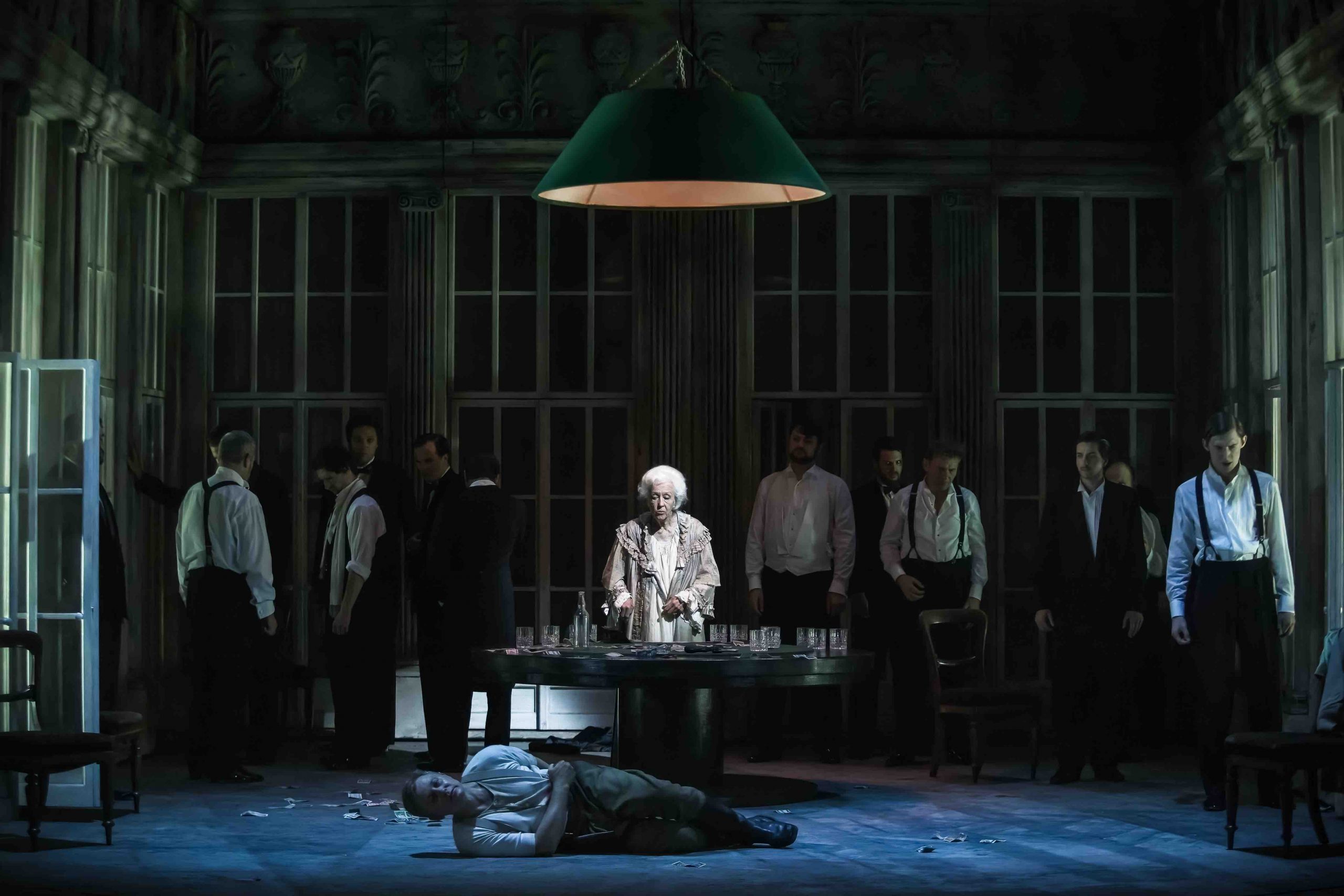
Clear, unfussy direction, a versatile and attractive set, rich orchestral playing, and singers thrilling in their artistry and authenticity – this was the pleasure of Grange Festival’s Queen of Spades.
At first it jars a little, having lots of patriotic Mother Russia sentiment expressed on stage at such a time of imperial warfare against Ukraine, but there is sufficient lampooning of the greatest empire builder Catherine the Great and the fact the singers are here and not in their homelands too make it all fine. It was Catherine, of course, who secured Ukraine’s coastline from the Ottomans for her empire. It is also a Gothic horror story that has a lost past and doomed future at its heart.

Anush Hovhannisyan
Director Paul Curran takes Tchaikovsky’s musical take on the great Pushkin story of love in that cold climate that took it up a social notch or two, making Liza the granddaughter of a Countess, her suitor a Prince and then adds some interpretations of his own. In costume and setting, the work starts in what seems to be Russia at the height, which was also the start of the end, of its imperial glory days as darkness of revolution loomed. While this does not change for most of the characters, the would-be lovers Herman and Liza, both desperate to break out of the confines of their assigned lives, appear in the closing scenes as from a later time, a Soviet era soldier and a 1940s woman.
Herman has become a reluctant soldier in the barracks, performing the Soviet version of goose-stepping as a bugle blows, while Liza could walk straight from the set of a wartime movie. Why? Perhaps it is about the fate of the Russians who break out of the imperial order in 1917, or maybe a warning that social change can bring as much pain as benefit. Either way it is an intriguing concept, particularly as they both (presumably) perish Herman shoots himself with his military pistol and Liza wanders into the long grass which I guess is the banks of a river.
The scene where the ghost of the Countess appears and reveals the secret three card trick is one of the weakest elements. It is clear she is going to appear out of a locker but Herman’s by now insanity, fear and desperation makes the scene still spine-tingling. As the aged woman from another period, Josephine Barstow has us in her hand, singing with total composure, at times a mere whisper, a measured pace and dramatically transfixing.

Josephine Barstow and Eduard Martynyuk
As the doomed would-be lovers, the characterisation is quite complex. Eduard Martynyuk is a picture of beige in the first half of the opera, already looking pale and slightly unhinged. His singing is vivid and controlled although his scenes with Liza are strangely distant, not even looking at her much of the time. His near zombie movements contrast with the very loud playing from the pit. Are they really in love or is each independently living out their own psychological trauma?
However, in the post interval second half he dramatically comes to life both physically and vocally, as obsession, ambition, and desire clash with guilt. A steadier dramatic characterisation is the Prince Yeletsky of Ilya Kutyukhin, Liza’s intended husband. He sings his glorious aria trying to understand Liza’s suffering exquisitely and most of the time returns to being the symbol of the rich, privileged Russian (historically doomed) aristocrat.
The pastoral section is excellent with three large partings (reminiscent of Lorrain’s landscapes) being the scenery for the stylised shepherd and shepherdess to perform their Arcadian scene. But in reality these high and mighty pompous party goers revert to the barbarians beneath their civilised facades, as they cavort, swig their alcohol, and quite happily have sex with the servants. It is in this 18th century themed masked ball romp that Catherine the Great appears only to be a caricature who reveals her backside to the revellers. In a similar vein the young ladies in the care of the Countess also lace their lemonade with liquor from a hip flask and dance in what they are chastised for being unladylike behaviour. That clinging on to decorum and an alien cultural façade is best told in the Countess’ forlorn song of her own younger days at the French court, all sung on French. The set is reminiscent of a winter garden, such as the Astoria in St Petersburg, or perhaps even the Grange’s own orangery that now houses the opera auditorium.

Ilya Kutyukhin
Andrei Kymach sings a mesmerising Count Tomsky. His inspiring baritone telling of the three cards tale sets the tone, and singing standard, for this remarkable ensemble put together by Grange Festival. Edwin Kaye and Alexey Dolgov strongly take the roles of Herman’s so-called friends Surin and Chekalinsky, who ridicule him behind his back as they encourage his card playing.
The rather cool Herman of the first acts contrasts with the passion of Liza and the velvet tone and phrasing from Anush Hovhannisyan with her exquisite tone and subtle phrasing, transforming from the naïve romantic girl to the shattered woman who must accept it is ambition and obsession with the three cards rather than her love that is now controlling Herman. Yes, she almost wails, he is a murderer.
Paul Daniel conducts the Bournemouth Symphony Orchestra in a performance that rises and rises in intensity until the tension-releasing and desperate climatic denouement

Edwin Kaye, Andrei Kymach and Alexey Dolgov
Images: Craig Fuller
Until July 2
https://thegrangefestival.co.uk/productions/book/queenofspades